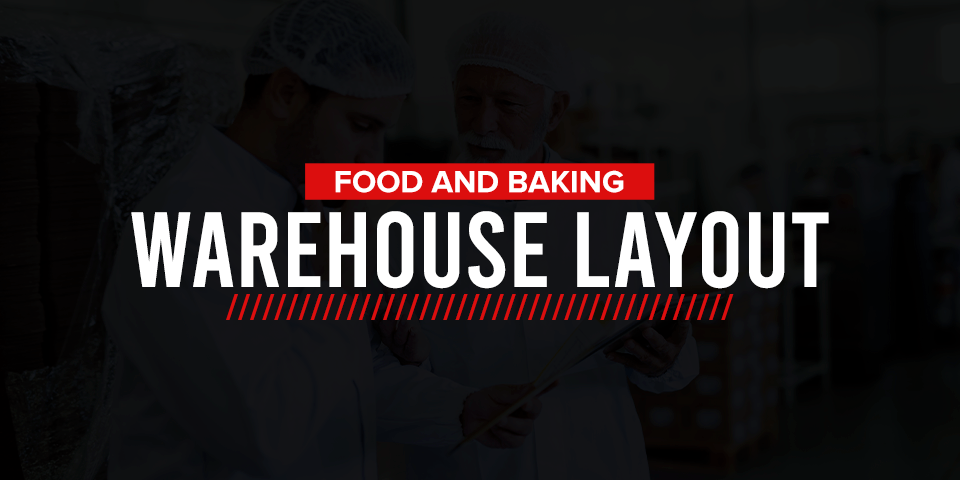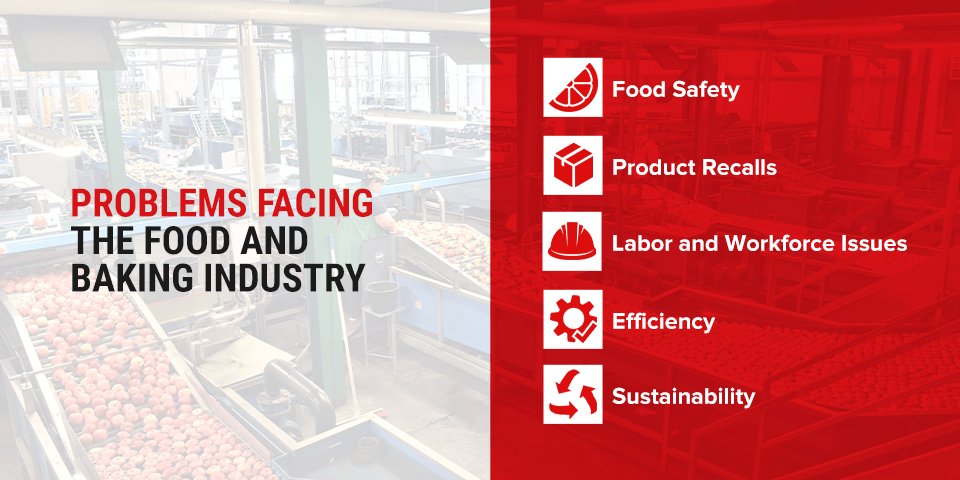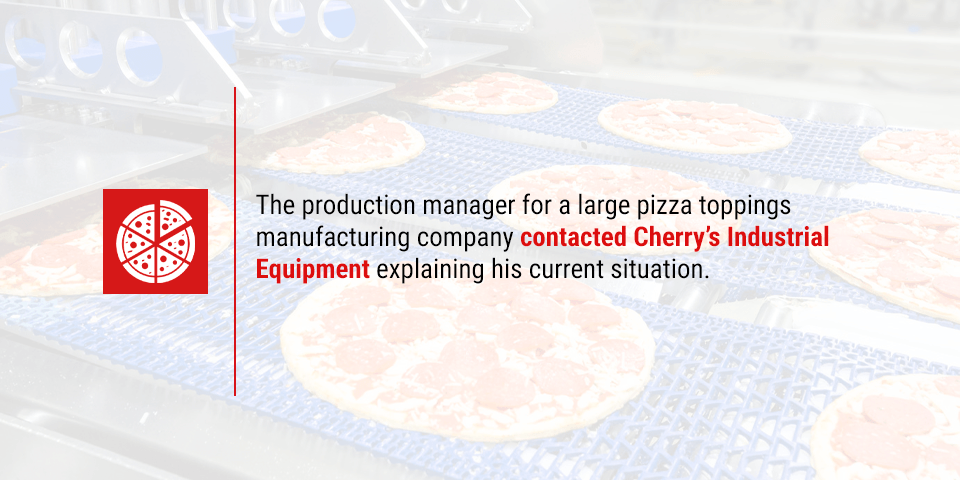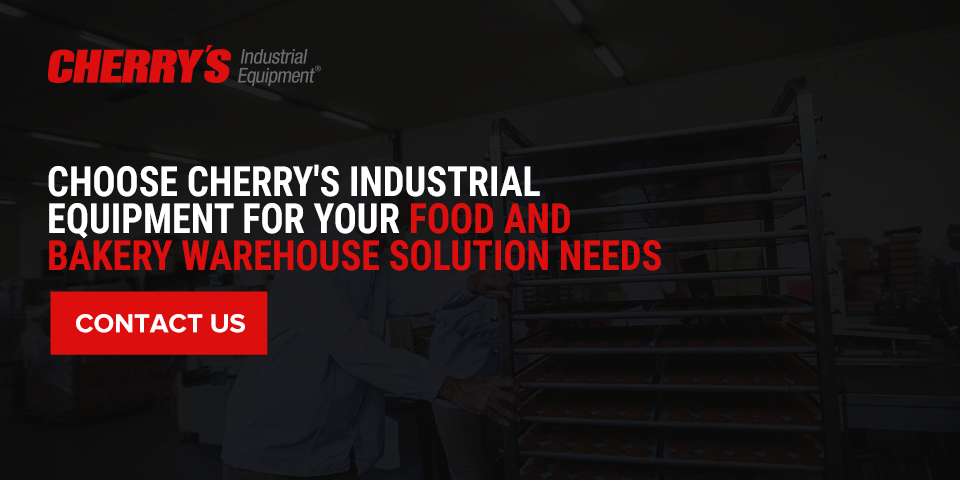Material Handling Equipment for the Food & Baking Industry
 Are you returning to work and worried about protecting the food supply chain? Consider adding sanitary equipment that fits into your warehouse layout to keep your operations safe. Optimizing your layout with more efficient and compact solutions can ensure proper sanitation and also improve productivity in food and bakery operations.
Are you returning to work and worried about protecting the food supply chain? Consider adding sanitary equipment that fits into your warehouse layout to keep your operations safe. Optimizing your layout with more efficient and compact solutions can ensure proper sanitation and also improve productivity in food and bakery operations.
As you look to build out an effective warehouse layout, consider the most common challenges and some of the top equipment solutions available to companies.
Jump To Sections:
- Problems Facing the Food and Baking Industry
- Solutions to These Challenges
- A Sample Warehouse
- Testimonials
- Choose Cherry’s Industrial Equipment
Problems Facing the Food and Baking Industry
Considering common challenges to food processing companies can help you form a plan to prevent these problems from negatively affecting your business. Below you can find the primary challenges facing the food and bakery industry:
1. Food Safety
In the food and baking industry, it’s extremely important to have clean food that is free of foodborne pathogens. Though many businesses are aware of the need for clean food, the Centers for Disease Control and Prevention (CDC) estimate foodborne parasites, viruses and bacteria still make one in six Americans ill each year. As a company, you want to avoid spreading illnesses to your customers through your products. That’s why it’s crucial for any company looking to stay competitive to ensure they have a safe food supply chain.
There are a few risk factors companies can prevent, such as poor hygiene at any part of the supply chain, improper agricultural practices and utilizing chemical materials incorrectly. Implementing strict and effective preventative measures can help reduce the risk of foodborne illnesses in the food preparation and processing stage. Additionally, companies can look out for improper storage and contaminated water, food and raw materials to reduce the spread of illnesses.
2. Product Recalls
According to a joint study from the Grocery Manufacturers Association (GMA) and the Food Marketing Institute, it costs companies $10 million in direct expenses on average when a recall occurs. And that’s just average costs. Another GMA study found 5% of multi-national corporations had recalls costing $100 million.
Preventing product recalls in the food and baking industries helps reduce direct expenses from lost product. Reducing the rate of product recalls can also help your company strengthen its brand and retain customers. A Harris Interactive poll discovered 15% of consumers would never purchase a recalled product again, while 21% would avoid buying from the brand in the future.
Fortunately, companies can take steps to minimize the chances of a recall. These steps usually include investing in more sanitary equipment and improving a warehouse’s layout to lower contamination risk.
3. Labor and Workforce Issues
There are millions of people working in the food production industry. Compared to other industries, food processing has an increased rate of injury. For example, a study from the Journal of Occupational and Environmental Medicine found that, when compared to non-food industries, food industry workers have a 60% higher rate of occupational illness and injury. Workers in the food industry also have more than twice the rate of lost-time injuries.
These workforce issues can cause productivity problems and can generate costs related to workers’ compensation claims. Companies who improve their workplace’s safety can protect themselves from potential lawsuits from injured employees. Greater safety in the workplace can also lead to fewer injuries, which keeps a company’s workforce at full capacity.
4. Efficiency
Inefficiency is almost always a concern of businesses in the food production industry. A more efficient warehouse keeps itself ahead of competitors by quickly storing, handling and transporting products. Keeping a warehouse efficient often comes down to having the right equipment to handle food products and having staff available who know how to use the equipment correctly.
Any competitive company can benefit from investing in equipment designed for peak efficiency and having well-trained staff to operate the machinery effectively,
5. Sustainability
As green technology and practices grow in importance, companies in the food processing industry are feeling more pressure to adapt and promote sustainability in their processes. Deforestation has been one of the most significant issues food processing companies have contributed to as a whole.
Deforestation causes an estimated 30% of global greenhouse emissions each year. One of the primary ways the food and baking industry has contributed to deforestation and global greenhouse emissions has been the production of wood pallets. If a company is interested in reducing deforestation and increasing sustainability, they can invest in plastic pallets instead of wood pallets.

Solutions to These Challenges
An optimized warehouse layout for the bakery and food industry is one of the main ways you can protect yourself from the challenges listed above. Knowing how to design a food and bakery warehouse starts with having the right equipment to make an effective closed-loop system. In a closed-loop system, equipment is dedicated to particular processes and is designed to work together to handle products from beginning to end. Often times, these systems can be rigged to be self-regulating and handle products autonomously.
Warehouse layout tips for the food industry often include a recommendation to use a closed-loop system, which can bolster efficiency. Much of Cherry’s equipment can be automated, and if it requires manual use, it is intuitive to operators. To optimize your layout and productivity, you may benefit from having high-quality equipment at your warehouse.
Below you can find some of the primary equipment solutions for the food and bakery industry:
- Pallet inverters: When you work with food, you likely use washable pallets to store it. If you need to transfer loads onto these pallets, a pallet inverter is an excellent choice. These inverters can lift, rotate, transfer and tilt pallets, eliminating the need for dangerous manual labor. The SC Model Single Clamp Pallet Inverter, for example, is one of the most popular inversion products we offer. The 180-degree inverter comes with multiple control options, which can be loaded and unloaded with a reach truck or forklift.
- Space and pallet retrievers: Spacer and pallet retrievers are designed to quickly remove spacers, switch out pallets and combine loads. They’re great for building an efficient warehouse, as they allow you to transfer loads to inbound or outbound pallets in minutes as opposed to the time and energy it takes to hand stack loads from one pallet to another. The pallet retrievers are also designed to be loaded at ground level which make it very ideal for companies that do not have fork lift trucks readily accessible. The more sophisticated PSR inline systems are fed using conveyors. These automatic spacer and pallet retrievers are an excellent piece of labor savings equipment for the food and bakery industry.
- Stretch wrappers: As you handle food, you’ll likely wrap products and pallets to cut back on or eliminate product damage. Premium stretch wrappers use film with 200% pre-stretch to protect your products. You can also find automatic stretch units designed for system integration, as they automatically wrap products without anyone needing to operate the machine.
- Plastic pallets: Looking for simple and effective sanitary equipment for the food and bakery industry? It starts with replacing wooden pallets with plastic ones. Plastic pallets are washable and as a result help prevent product contamination. They are also more durable than wooden pallets, and the best pallets are made with FDA compliant materials. To ensure cleanliness for your plastic pallets explore Cherry’s selection of pallet washers which includes the optional modular dryer.
- Custom solutions: Sometimes, standard equipment needed for food and bakery industry production isn’t the best fit. Whether you need more safety features or want greater system integration, you can work with an industry-leading manufacturer to create custom equipment solutions. When you work with Cherry’s Industrial, we can engineer and produce the type of equipment you desire to improve your warehouse processes.
A Sample Warehouse
What might a food and baking warehouse look like?

Testimonials
When investing in the solutions offered above, you may want to work with a company that can provide warehouse design tips for food processing companies. At Cherry’s, we have a positive track record of providing companies with equipment tailored to their needs and industry. To give you an idea of how Cherry’s can help, take a moment to review two client testimonials illustrating how we assist food product companies:

1. Pizza Topping Manufacturer
The production manager for a large pizza toppings manufacturing company contacted Cherry’s Industrial Equipment explaining his current situation. He needed a way to ergonomically raise product to a safe working height and eliminate bending and reaching for the employees.
The Challenge
The solution needed to be washable and constructed of stainless steel. It also had to lift product to an ideal ergonomic height ranging from 32 inches to 36 inches. Additionally, the lifts would be used in a production area with plastic pallets with closed bottoms, meaning the lift tables needed to be ground-level loadable and portable. After further discussion and discovery, it was determined an on-site visit and ergonomic review at the customer’s facility would be best for determining the right solution for this specific application.
With the tour of the pizza facilities underway, Cherry’s account manager saw the company needed six stainless steel lift tables that were ground loadable, washable and portable. They currently had stainless steel ground loaded lift tables, but they were stationary and bolted to the floor. To make matters more challenging, their lift tables were stationed in between production lines and the walls with very little space accessible for staff to work on both sides of the lift table. Real estate was a precious commodity.
The Solution
With a portable feature added to the stainless steel ground loadable lift table, the employees could simply move the lift table to where they had more space to get their job done. Once their task was completed, they could then return the lift table to its original tight quarter station. It was evident, based on the customer’s specific situation, the portable stainless steel ground loadable lift table was the solution that would serve this pizza company’s needs.
Our account manager went to work and found a supplier who could help us with a custom-designed solution for our customer. The six stainless steel portable ground-loadable lift tables are currently in fabrication, and the customer is excited to know a solution has been found for their material-handling processes.
2. Airline Food Service Company
The Director of Distribution for in-flight food service at a well-known airline reached out to Cherry’s Industrial after having some issues with contamination in their food production facility.
The Challenge
Food safety and elimination of contaminants were top concerns, and they realized it was imperative to switch over from wood pallets to plastic pallets in their facilities. In addition to ingredients and materials, finished products would be switched onto a clean pallet at the time of receipt in the facility, and a “no wood pallet” policy would be implemented.
For these reasons, it was important to start with specifications and testing for the plastic pallet to meet their key requirements: one-piece design, rackable, washable and rugged for repeated use.
The Solution
From here, the next step was to determine the correct machine that would best transfer loads from wood pallets to plastic pallets. After further discussion and visiting their facility, it was decided the right machine for their specific application was the DV-PE90 Pallet Changer.
Since the airline’s facility did not have forklift trucks, but rather pallet stackers and electric pallet trucks, it made complete sense to have a ground loadable pallet changer. The airline purchased the DV-PE90 Pallet Changer with high style guarding and light curtains, along with the plastic pallets recommended by our product specialist.
After the initial use, it was apparent the new pallet changing process was safe, reliable and fast. As an added benefit, the customer was able to reduce the number of plastic pallets kept on hand significantly. The company received this benefit because the machine could easily change out the pallets as needed without causing traffic jams on the receiving dock as the product entered the building. The solution provided was implemented in the client’s Denver, Houston and Newark facilities. Further discussions are taking place for their other facilities as well.
Want a visual demonstration of the DV Pallet Changer? Take a look at it in action.
Choose Cherry’s Industrial Equipment for Your Food and Bakery Warehouse Solution Needs
Now that you know the challenges facing companies and some of the top solutions for effective food and bakery industry equipment layout, you’re ready to start looking for the best option for your business. At Cherry’s, we’re prepared to help you find the most appropriate and efficient equipment for your warehouse. Browse our collection of equipment suited for food and bakery industry production to get an idea of what we offer.
If you have any questions or want a custom solution, contact us today to speak with a material handling specialist.

